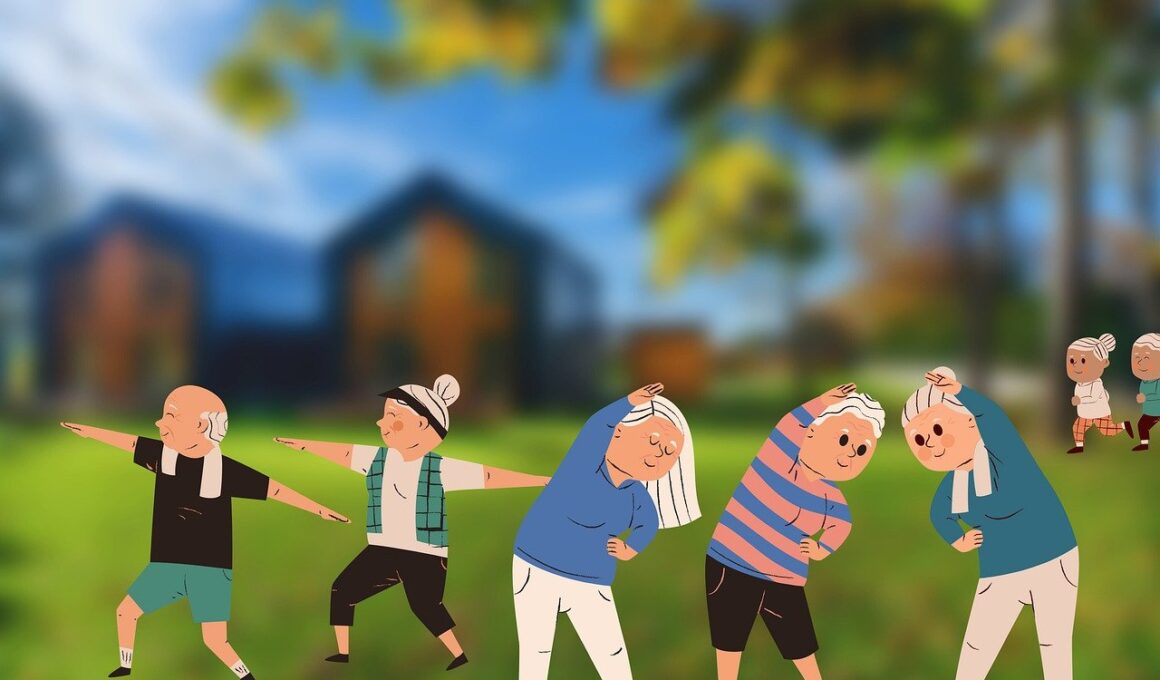Benefits of Group Exercise Programs for Seniors with Chronic Illnesses
Group exercise programs offer significant advantages for seniors managing chronic illnesses. Engaging in exercises together fosters a sense of community and belonging. Moreover, this social aspect can mitigate feelings of loneliness and depression. Overall, the group environment encourages consistent attendance and commitment. When seniors work together, they can motivate and support each other. This group dynamic helps participants stay accountable and engaged in their health journey. Furthermore, many exercises are tailored for older adults, ensuring safety and effectiveness. Group workouts often include low-impact options suitable for various health conditions. In these sessions, seniors learn proper techniques to avoid injuries, enhancing their physical fitness safely. A variety of exercises, such as strength training and stretching, benefits different aspects of health. Importantly, these physical activities can improve balance and flexibility, reducing the risk of falls. Additionally, regular participation in group exercises can lead to a noticeable enhancement in overall health. This improvement not only encourages physical wellness but also boosts mental health, helping seniors to lead more fulfilling lives. Thus, group exercise is vital for enhancing the quality of life among seniors living with chronic illnesses.
Another critical benefit of group exercise programs is the opportunity for professional guidance. Often, these sessions are facilitated by certified trainers or instructors. Their expertise ensures that seniors exercise correctly and effectively. Instructors can offer modifications for different fitness levels, ensuring everyone can participate comfortably. Both strength training and cardio are usually part of the exercise regimen. This diversity helps cater to a range of abilities and interests in participants. Moreover, professionals can address specific concerns regarding chronic diseases. Personalized advice in a group setting elevates both safety and efficacy, allowing seniors to exercise within their limits. Importantly, these sessions create structured routines, leading to long-term lifestyle changes. Seniors are more likely to adopt physical activity as a habit when supervised. Furthermore, relationships form between attendees and instructors, creating a supportive atmosphere. This support helps seniors remain motivated, enhancing the likelihood of success. Many seniors find that the friendships they build in these settings provide additional encouragement. Consequently, participants may push themselves harder during workouts. Improved outcomes often result from this mutual support and encouragement in reaching health goals. Therefore, professional guidance enhances the overall benefits of group exercise for seniors.
Health Benefits of Regular Exercise
Regular group exercise can provide numerous health benefits for seniors with chronic illnesses. Physical activity strengthens the cardiovascular system, leading to improved heart health. This is crucial for those managing conditions like hypertension or diabetes. Furthermore, exercise helps control weight and improve insulin sensitivity. Additionally, seniors may experience lower cholesterol levels due to regular activity. Muscles and bones gain strength through consistent exercise. This advantage reduces the risk of osteoporosis, a common concern among older adults. Furthermore, seniors can improve their mobility and independence through enhanced strength and flexibility. Regular participation in group workouts encourages them to engage actively in daily tasks. Furthermore, joint pain often subsides with regular low-impact activity. This improvement is particularly beneficial for those with arthritis or chronic pain conditions. Enhanced circulation from exercise aids in quicker recovery from ailments. Additionally, seniors frequently report better sleep quality with regular physical engagement. Overall, these benefits contribute to a healthier, longer life. Aging gracefully while maintaining physical fitness is an essential aspect of overall well-being. Therefore, incorporating group exercise into the weekly routine is essential for seniors wanting to thrive despite chronic illnesses.
Another vital advantage of group exercise programs is the boost in mental health. Physical activity releases endorphins, hormones that promote feelings of happiness and reduce stress. Seniors with chronic illnesses often face challenges with mental health, including anxiety and depression. Group exercise combats these issues by providing a structured outlet for emotions. Furthermore, group sessions create an opportunity for seniors to share their experiences. By connecting with others facing similar challenges, they feel less isolated. These interactions foster friendships and support, which can be invaluable. Mental stimulation is also a crucial aspect of group exercises. Engaging with others in a social setting helps retain cognitive function. This engagement prevents cognitive decline often seen in elderly individuals. Regular social interaction is vital for maintaining mental acuity. Additionally, participation promotes a sense of achievement and empowerment. Seniors can set and accomplish personal fitness goals together. This collective success enhances their self-esteem and overall outlook on life. Importantly, they become more resilient in dealing with their chronic conditions. Hence, the mental health benefits derived from group exercise cannot be overlooked. Their investment in physical fitness significantly promotes emotional well-being.
Creating a Routine and Commitment
Establishing a consistent routine is essential for seniors with chronic illnesses. Group exercise programs offer structure that enables older adults to maintain regular physical activity. When seniors schedule workouts weekly, they develop a sense of accountability. This routine helps in adhering to fitness goals over long periods. As weeks pass, attendees form a tight-knit community, fostering a supportive environment. Participation becomes more than just exercise; it evolves into meaningful engagement. This regular commitment influences overall lifestyles, promoting better eating habits. Seniors often feel encouraged to make healthier choices outside of the group setting. Furthermore, a stable routine contributes to improved mental health. Consistency in physical activity reduces anxiety levels and promotes relaxation. Moreover, it enhances discipline and determination. Having a reliable schedule minimizes the temptation to skip sessions. Seniors learn to prioritize their health when they see positive changes within themselves. Consequently, they develop resilience in the face of their chronic conditions. Acquiring discipline through regular exercise creates a ripple effect across other life areas. All these factors contribute to a more fulfilling lifestyle. Therefore, establishing a routine through group exercise is vital for seniors managing chronic health issues.
The role of nutrition combined with exercise in group programs is crucial. Nutrition enhances the positive effects of physical activity, especially for seniors. Healthy eating patterns support exercise goals, ensuring optimal energy levels. Moreover, nutrition plays a significant role in managing chronic illnesses. Group exercise sessions often include discussions about healthy eating habits. Facilitators can share nutritional tips that complement physical activity. This holistic approach to health benefits everyone involved, enhancing overall wellness. Attendees participating in both exercise and nutrition workshops often report increased motivation. This improvement encourages seniors to apply healthy choices in their daily lives. Maintaining a balanced diet leads to better recovery post-exercise. Therefore, groups that integrate nutrition education empower seniors significantly. Additionally, this education instills lifelong healthy habits. Seniors are more likely to continue these habits independently if they understand their benefits. Group camaraderie also encourages better dietary choices, with members sharing recipes and meal ideas. Nutrition’s impact on overall health cannot be overstated. When combined with engaging group exercise, it creates a powerful approach to managing chronic illnesses effectively. Seniors learn to prioritize both fitness and nutrition, sustaining long-term health and wellness.
Conclusion: Group Exercise as a Lifeline
In conclusion, group exercise programs present an effective solution for seniors dealing with chronic illnesses. The numerous physical and mental health benefits contribute significantly to enhancing their quality of life. By fostering a sense of community, they provide essential social interactions that combat loneliness. Professional guidance in these programs helps to maximize safety and effectiveness. Moreover, regular physical activity improves seniors’ physical health and mental resilience. Group exercises establish positive routines that encourage participants to stay committed to their fitness goals. Additionally, the inclusion of nutritional education amplifies the benefits gained from physical activity. Throughout this journey, seniors become empowered to take control of their health and well-being. They often develop friendships and support networks invaluable in their lives. Ultimately, group exercise acts as a lifeline, supporting seniors in managing chronic conditions proactively. As a powerful tool, it encourages healthier, more fulfilling lifestyles. Therefore, embracing group exercise programs is an essential step toward promoting longevity and enhancing well-being in older adults. To summarize, seniors can lead healthier, happier lives through group exercise to combat the effects of chronic illness.
In addition to the numerous benefits of group exercise programs, they present opportunities for discovering new skills and passions. These programs often include various activities such as dance, yoga, or water aerobics. Seniors can experiment with different types of exercise to find what resonates with them and contributes to their wellness. Trying new activities is important since it may help rekindle old interests or develop new hobbies. This exploration adds excitement and variety to their physical fitness journey. Group classes typically cater to diverse interests and abilities, allowing seniors to participate meaningfully. They can choose classes that they find joy in, which increases motivation and enjoyment in their routine. Most importantly, participation in such diverse activities helps improve overall health in various ways. Fitness becomes not just a chore but a source of joy and fulfillment. Lastly, the benefits of expanding physical activities contribute to cognitive health as well. Learning new movements and techniques stimulates the brain and may help delay cognitive decline. Therefore, it is essential to highlight the importance of exploring various activities within group programs for seniors looking to enhance their health.





